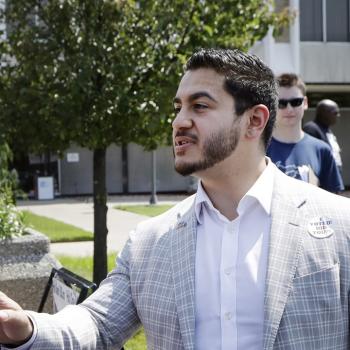 |
|
…put to paper
|
Writers’ festivals always attract a host of interesting, eccentric and controversial writers. Last year, top billing at the Sydney Writers’ Festival was for Dutch-Somali neo-Conservative Ayaan Hirsi Ali (not her real name, which is in fact Ayaan Hirsi Magaan).
Among this year’s big overseas guests is a rather ordinary chap who has written a memoir of growing up in England.
It’s hardly a very original feat to write a memoir. In fact, it’s perhaps the easiest kind of book to write. I should know – I’m writing one myself at the moment. And for some reason, Australian publisher Allen & Unwin is paying me for it!
Imran Ahmad’s memoir, however, doesn’t deal with such complicated and allegedly controversial topics as young people navigating their way through political Islamism. It’s really just the story of a very ordinary young English Muslim growing up in a relatively conventional Pakistani Muslim household.
And believe it or not, that’s what makes it so powerful. It’s also what made me want to read the book in almost one complete sitting, without having to attend to other superfluous matters like my job or paying bills.
So it was good to put work considerations aside and catch up with Ahmad during his Sydney visit to find out more about this extraordinarily ordinary British Muslim.
Unimagined: a Muslim boy meets the West is the story of a middle-class English boy who goes to a grammar school, completes university studies, falls in love with various females along the way and ends up pursuing a career in the internal audit department of a major multinational, earning enough money to buy a house and the same Jaguar his hero James Bond drives.
This memoir contains no violence (apart from some schoolyard bullying), no honour killings and only the feeblest reference to a possible arranged marriage. In fact, what makes this work so abnormal among so many other Muslim memoirs published in Britain, such as Ed Husain’s The Islamist, is that the life it describes is just so normal.
I doubt cultural warriors like British tabloid journalist Melanie Phillips (author of Londonistan) or American blogger Daniel Pipes will refer to this book as an example of British or Western Islam in action (or should that be inaction?). Imran Ahmad has written an amusing and highly accessible book which deals with a range of theological and cross-cultural issues by telling the story of the Muslim he knows best.
One lesson familiar to many readers is that Muslim religious life is often best understood within a cultural context, with little relation to that within which a certain 7th-century Arabian Prophet presented his message. Hence, many South-Asian Muslim parents have almost identical expectations of their children as South-Asian Hindu, Sikh, Jain, Buddhist, Catholic or Jewish parents. It’s of little consequence to such parents whether you can read the Koran in Arabic or the Guru Granth in Punjabi or even the Torah in Hebrew. So long as you study hard and become a doctor or engineer and marry a good South-Asian girl of your own social class and faith (with emphasis especially put on the former), nothing else matters.
Perhaps what makes Imran’s experience different from that of an English boy of Hindu or Sikh parents is that his own faith and scriptures share much in common with the Biblical stories he learned in school. I can certainly relate to this as an important factor allowing me to ”fit in” more easily.
For me, the discovery that the Koranic account of Joseph’s life was virtually identical to that in the Bible (and that my own surname was merely an Arabic pronunciation of this famous person) was a seminal moment in the development of my own religious identity.
Like so many children of Muslim migrants, Ahmad must figure out the answers to a range of theological questions without assistance from parents or imams. Instead, most of his learning is at the University of Sterling in Scotland, where Ahmad has enrolled in a chemistry course in which he takes no interest, but which he believes might make him more employable and respectable in South-Asian circles.
Theological issues feature heavily in the book, with Ahmad constantly toiling with the whole idea of spending an eternity burning in hell because he made the wrong religious choice. Ahmad is also troubled by certain moral choices, and operates on the common South-Asian Muslim presumption that salvation is obtained by doing good deeds and avoiding naughty ones.
Ahmad spends hours in the library reading books about Sufism, and also borrows tapes of religious polemics from fellow students. He is put off by the narrow-mindedness of the chap who delivers sermons at Friday prayers, but is attracted to the intellectualism of study circles organised in a London mosque by Yusuf Islam (formerly Cat Stevens).
And what does Ahmad learn in the mosque? His book describes with good humour his first mosque experience.
My father tends to get time off on Fridays, and in the school holidays he takes us to a mosque in Wimbledon for Friday prayers. The mosque is really a terraced house, devoid of furniture, white sheets spread over all the floors. The entrance hall is piled with pairs of shoes. My father sends us upstairs, which seems to be designated for boys, whilst he prays downstairs with the men. We sit on the floor in a room with other Pakistani boys, who all seem to know each other.
The formal congregational prayer is not too difficult. My brothers and I merely go along with all the bowing and kneeling and prostrating, along with everyone else. The problem is that after the official Friday prayer ritual is over, there seems to be some form of optional prayers which everyone does, but they do them separately, in their own time, not in a co-ordinated way. Not having a clue what to do and not wanting to stand out from the crowd, I always select someone in my line of sight and copy his every move, pretending to be muttering the Arabic prayers under my breath.
One day I am rumbled. A youth in my row stares at me, then calls to his friend, ‘Hey Wajid, he’s copying you.’
I carry on, pretending to be oblivious to this, as if I’m not really copying Wajid. He finishes and looks around at me. They both confront me.
‘You don’t know how to pray?’ Wajid asks me in a critical way. ‘Can you read Qur’an?’ He is proud of the fact that he obviously can and I must be stupid.
I shake my head miserably. I’m a foreigner in white, English society and I don’t seem to fit into Pakistani society either.
Ahmad doesn’t venture anywhere near political Islam. Perhaps this is because he had already entered the workforce by the time the Afghan jihad and its Islamist theology was being promoted by conservative governments and right-wing think tanks (not to mention mosque imams) across the West. And how does Ahmad view himself? What are his ethnic layers of identity?
“I do have an awareness that Pakistanis of the older generation cannot avoid classing people by their regional place of origin, and retain petty prejudices based on these. I am somewhat ignorant of these distinctions and don’t pay any attention to them. For example: am I Muhajir, because my parents moved from India, or am I Sindhi because I was born in Karachi? I don’t give a damn.”
And how does Ahmad view mosque elders in Britain? I wonder if young American Muslims can relate to his sentiments.
“These people are ignorant, self-obsessed hillbillies. They want to bring the tribalism and selfish arrogance of their Pakistani villages to this mosque in London. They want it to be a Pakistani mosque, with all the baggage that comes with that. Why else are the sermons in Urdu, not English? Why else would there be ‘irregularities’, if not because the election was run along Pakistani lines, with a Pakistani mindset? (This means that cheating and vote-rigging are the norm). Why is such a significant Muslim institution in London being run solely for the benefit of Pakistanis, rather than all British Muslims? … They just can’t grasp the enormity of what is happening. They are too stupid to be terrorists, but also too stupid to identify and stamp out the seeds of terrorism.”
On the other hand, Ahmad has had better experience with his time in the Muslim Students Association at university.
“It was during my time at university when – for the first time ever – I had fasted for all thirty days of Ramadan (and that was in Scotland in the height of summer, with 18-hour days). On the morning of Eid, there was a prayer meeting on campus and I was just overwhelmed by the brotherhood of all the different nationalities. We were all on an emotional and spiritual high – now that the extreme challenge of Ramadan was over – the food was delicious, and everyone was just so peaceful and spiritual. That was when I first felt that I was part of a global umma which transcended every border and tribe. If only all Muslims felt like that, all the time.”
Yes, indeed. If only …
Associate Editor Irfan Yusuf is a Sydney lawyer whose work on young Muslims navigating into and out of political Islam was awarded the 2007 Allen & Unwin Iremonger Award for public affairs writing.











